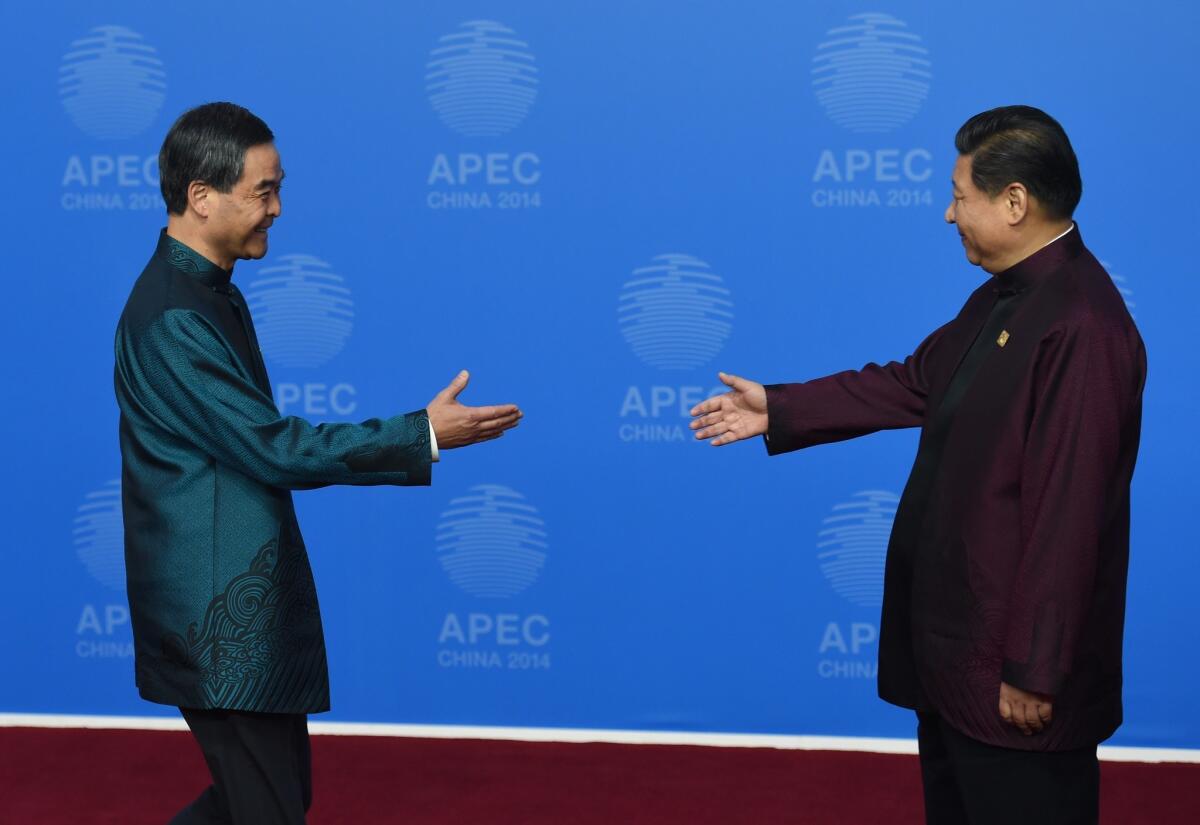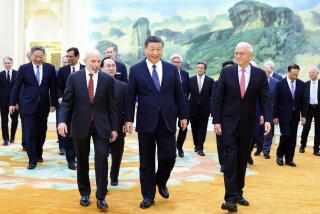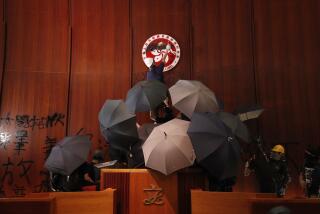China’s president praises Hong Kong chief’s handling of protests

Chinese President Xi Jinping expressed his support Sunday for the Hong Kong government’s handling of the ongoing pro-democracy demonstrations, even as student protest leaders sought to schedule direct talks with central government authorities.
Xi met with Hong Kong Chief Executive Leung Chun-ying on the sidelines of the Asia-Pacific Economic Cooperation forum in Beijing. It was the first time the two had met face-to-face since the protests began in late September. Xi thanked Leung for his efforts to “govern in line with law,” and “to safeguard the authority of rule of law and maintain social order.”
Protesters in Hong Kong, a former British territory that returned to Chinese rule in 1997 under a framework known as “one country, two systems,” took to the streets seven weeks ago after the standing committee of China’s National People’s Congress laid down a tougher-than-expected framework for the city’s chief executive election in 2017. Protesters say the framework will unreasonably limit the choice of candidates to only two or three that Beijing approves of.
Citing a line from an ancient poem that says “strong winds reveal the strength of sturdy grass,” Xi praised Leung’s resilience in handling the protests and said the Hong Kong leader was “reliable in a critical time,” according to mainland and Hong Kong news outlets, which cited an unnamed source who attended the meeting.
The poem, attributed to Emperor Taizong during the Tang dynasty, has often been cited by Chinese rulers to praise loyal ministers.
Xi told Leung that the central government was committed to the “one country, two systems” principle and to enacting a one-person, one-vote system in 2017. Until now, the chief executive has been selected by a committee of 1,200.
The meeting reportedly lasted 40 minutes, 10 minutes longer than planned.
Meanwhile, Hong Kong’s first chief executive, Tung Chee-hwa, officially launched a new think tank on Monday called Our Hong Kong Foundation.
Two of its main missions, Tung said, are to seek social consensus on Hong Kong’s chief executive election process, and to help improve the government’s policy making to benefit the younger generation. Hong Kong’s protest movement has highlighted a deep generational divide, with many young people expressing frustration at issues such as soaring housing costs.
Tung, now a vice chairman of the National Committee of the Chinese People’s Political Consultative Conference, was reportedly inspired to set up the think tank by the active role of such bodies in American politics.
The organization has about 80 advisors, drawn from the business, education, social welfare, legal and religious sectors, including former financial secretary Antony Leung, former Monetary Authority chief executive Joseph Yam, and Jack Ma, the chairman of Chinese e-commerce giant Alibaba.
Tung reiterated his call for protesters to leave the streets, saying it was affecting the economy, undermining the rule of law and tearing society apart.
“Protesters, especially students, should have the courage to end the occupation campaign,” said Tung, adding that the think tank would examine ways to “democratize” the nomination committee that Beijing insists must approve all candidates for the chief executive election.
The Hong Kong Federation of Students, a leading group behind the protests, sent an open letter to Tung last week urging him to help set up a meeting between student leaders and Beijing officials in charge of Hong Kong affairs.
Tung responded that Beijing has already heard their voices and the decision on the 2017 election process cannot be revised.
But the student group says the protests are proof that the central government does not fully understand the multiplicity of opinions among Hong Kong people.
Hundreds of protesters marched to the central government’s liaison office in Hong Kong on Sunday, demanding a direct meeting with Beijing officials and a repeal of the National People’s Congress decision.
Alex Chow, head of the federation, took part in the march and said the group would write to all 35 local delegates to the National People’s Congress to ask them to help set up talks with Beijing officials.
“Hong Kongers are completely disappointed at the government for failing to find a way out of the current political dilemma,” protest leader Daisy Chan said.
Hui is a special correspondent.
More to Read
Start your day right
Sign up for Essential California for news, features and recommendations from the L.A. Times and beyond in your inbox six days a week.
You may occasionally receive promotional content from the Los Angeles Times.






